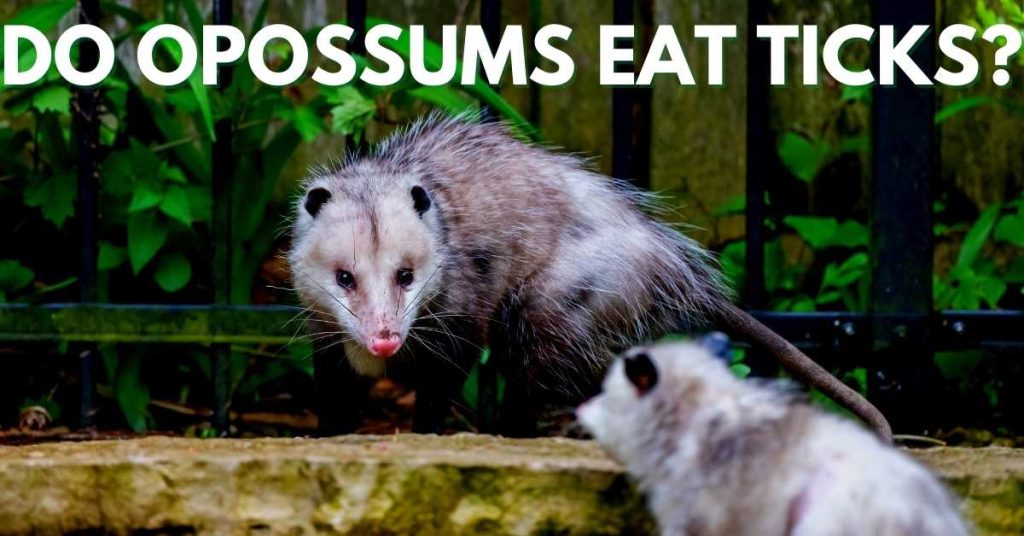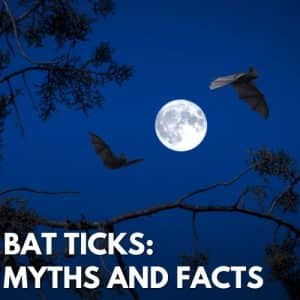
Opossums, a suborder of 70 tree-living marsupial species in the USA, can navigate tall trees with surprising agility and aplomb. Opossums hide in dark areas such as attics, sheds, and garages and cause damage and destruction to gardens, farms, forests, and equipment.
Opossums are omnivorous animals. They are no dangerous species to humans on their own, but they can spread some diseases when they pierce our skin with their sharp claws. It is best to keep them away from the residential area. People nowadays want to pet opossums in their backyards. Do you know why? It is because of the most probable question in the entire United States – Do opossums eat ticks?
If that is a yes, why are opossums good? How many ticks do possums eat? You will find answers to these questions in the blog. Read it through!
Opossum and Ticks:
The central, northern, and southern parts of the United States have the primary distribution of opossums. They are also referred to as possums in some parts of the USA. It is a wild animal and opportunistic eater, consuming anything for survival. There are 100 species of opossums. Among them, Virginia opossums are the only species in the United States. They don’t intentionally hunt the ticks and will frequently groom themselves. While grooming, if they find the ticks in their body, they will consume them. One of the benefits of opossums is that they have the immune power to resist Lyme disease, so if a tick makes opossums a host, they are less likely to carry the disease. They will eat more than 90% of ticks on their body. The American dog tick, Lone star ticks, and black-legged ticks mostly prefer to have opossums as their host in the nymph stage.
Are the Opossums An Ecological Trap For Pests?
Some beliefs about opossums (members of the marsupial order Didelphimorphia endemic to America) are that they are one of the animals that eat ticks, which help cut back on Lyme Disease in the environment, and act like little vacuum cleaners of the ecosystem preventing environment from spreading many tick diseases.
A study in 2021 on Virginia opossums revealed that they serve as hosts to many ectoparasite species including ticks. It was assured by the previous research in 2009 that states opossums can eat around 5500 larval ticks per week.
To check the fact, the members of the study crew analyzed the stomach content of 32 Virginia opossums from central Illinois. But they failed to find ticks or tick parts in the stomach contents of Virginia opossums. They have used various methods to check the traces of ticks in their stomach. But none of the techniques show any evidence.
This makes us return to the same question again – Do opossums eat ticks? Yes. Lets support this with a theory. This opossum-eating-ticks theory started with a study report in 2009. In that study, members in New York placed mammals and birds (including white-footed mice, chipmunks, gray squirrels, opossums, catbirds, and veer) into cages with 100 larval ticks.
After four days, they found that squirrels and opossums seemed to rid themselves of the most ticks. They killed 83 to 96.5 percent of the ticks, whereas opossums killed more. For both contrasting results of the 2009 and 2021 studies, we found that the Rick Ostfeld book on Lyme disease ecology provides a comprehensive answer. It states that the opossums are good groomers and could eat 96% of ticks in its body. Thus, they concluded that opossums make them an ecological trap for ticks.
Still Wondering about Opossums Eating Ticks – Misconception or Truth?
Like any other pests, opossums also attract some parasites like the black-legged tick or deer tick. We know that the black-legged tick is the primary carrier of Lyme disease. During the late summer, opossums could be infested with hundreds of ticks.
But still, the question is, do possums eat ticks?. Many studies state that there is no evidence that opossums eat a significant number of ticks. So, when someone says the opossum-tick-eating thing, it is not completely true.
Yes! Of course, the belief that opossums eat tons of ticks has improved how people perceive them. This belief encouraged many people to rethink their desire to harm them. But the truth is opossums do not eat a lot of ticks. But still, they matter and play an essential role in our environment.
- Opossums are helpful to ecosystems and a healthy environment as they will catch and eat cockroaches, rats, and mice. They are resistant to snake venom, copperheads, and rattlesnakes.
- Opossums can minimize the chances of encountering venomous species near your home.
- Adult opossums are active at night and live in the burrow and cavities. They freeze and lie still as death when frightened or harmed.
Evidence To Spotlight About Opossum Eating Ticks
Opossums might eat ticks in a large amount, but they do not eat to kill or consume ticks. Opossums only eliminate ticks that comes their way, either that are stuck to their body as a host or when they find ticks enveloping their habitat. Opossums eating ticks is just an ecological balance played and not an intentional factor. The interesting fact is, this kind of ecological balance had reduced the rise in deer tick populations and the spread of Lyme disease. So, is it a good idea to pet opossums? May be or may be not.
Opossum tick control: Benefits of Opossums
Opossums act as a great predator of ticks. Some of the benefits of opossums are given below
- Tick populations increased in the U.S in the last few years. They are the carriers of various diseases like Lyme, tick-borne disease; Rocky Mountain spotted fever, etc. The most appreciated benefit of opossums is their ability to eradicate ticks. The appearance and nocturnal lifestyle of opossum make it so unappealing. But they are helpful compared to other types of wildlife as they play an essential role in the ecosystem and act as a valuable asset to your garden.
- Opossums help you eliminate small insects like ticks and pests from your garden.
- As omnivores, they consume various foods like ticks, beetles, slugs, and snails that damage garden plants.
- Another benefit to having these creatures around is they eat plant matter. They prefer fallen or rotting vegetation and cleaning up dropped fruits and vegetables, thereby helping in balancing the environment.
- They can hunt and kill mice, rats, and poisonous snakes and clean up dead animal carcasses.
- Opossums will not spread diseases like rabies and botulism, as they have a resistance to those diseases.
How Many Ticks Do Possums Eat?
The opossums eat 96% of ticks stuck into his body while it grooms. It may eat nearly 5500 larval ticks per week. Despite the fact that opossums are voracious tick eaters, there is no scientific evidence that possums eat ticks more effectively than other species. Opossums do not intend to feed on ticks but they could eat ticks if they are sticking on to their body.
Do opossums eat mice?
Yes, opossums eat mice. They hunt and eat rats, mice, and cockroaches. It will also eat snails, slugs, and other garden pests. Some people consider opossums to be trouble, but it also helps people by eating venomous snakes since they are venom resistant.
Opossum Tick Myths
Here are some opossum tick myths and explanations that can give you more clarity about opossums and ticks.
1. Opossums don’t carry any disease:
Opossums are more often resistant to rabies and other tick-related diseases, especially Lyme disease. But they could carry other tick-borne diseases such as tick-relapsing fever, tularemia, and toxoplasmosis. So, opossums act as natural pest control. But, they cannot keep you away from tick-borne diseases in the USA. So, try to avoid them by entering your home and gardens.
2. Short-tailed opossums catch ticks:
The short-tailed Opossums are imported for pet friendly purposes. It belongs to the Opossum species and is also called grey short-tailed opossums. In general, Opossums will not catch ticks. It just eats the ticks, which attach to the body. If it is a pet-friendly creature and owners properly care for it, they are less likely to connect to the tick. So, the short-tailed tick opossums are not meant for tick repellent purposes.
3. Opossums could be raised as pets:
Since opossums are natural tick and pest repellents, Some may consider raising them in their gardens. In the United States, opossums could be raised as pets. In most cases, if people want to raise Virginia opossums, they need a Captive Wildlife permit. To know more about the permit, Click here. In most states, short-tailed opossums are considered pets without permits.
Prevention From Opossums And Ticks
Even though opossums act as the deadliest predator for ticks, that does not mean that they are a friend to humans too. Opossums are some messy creatures and they can probably cause damage to your backyard. Below are some pointers that will help you prevent opossum from attacking you and your property.
Prevention from opossums:
- Cover all the unwanted openings in your house that possums can use to gain access. Use wire mesh for large holes and slotted vent covers to provide ventilation holes.
- Cut down your tree branches to at least 50ft from the rooftop of your home, as the possums can use the overhanging branches to access your house. They are good at climbing.
- Use grid screens and other suitable barriers that protect your low decks from possums.
- When you leave outdoor bins uncovered at night, it will attract possums and other wild animals due to the presence of food. So always cover your outdoor bin area.
- Proper clean-up of leftover food on your property is necessary. Clear the things immediately from barbecues to avoid attracting wild animals and possums.
Prevention from ticks:
You can keep away ticks by following simple landscape changes and creating an unfriendly environment for different ticks and hosts.
- Ticks love to stay in the underbrush of tall grass. There they latch onto a host and crawl up the body. Trim your lawns at home to avoid this scenario.
- Walk in the center of the trails and regularly clean leaf litter around the edge of your yard and home.
- Building a barrier between lawns and wooded areas prevents ticks away from the residential areas.
- Spraying pesticides on ticks minimize their exposure. Always ensure to use the best pesticide. Spray the pesticide correctly and at the right time of year.
- Today, many repellents are available in the market to keep ticks away. You can use both natural and chemical repellents based on your need. Natural repellents include ones made from garlic oil, mixed essential oils, and fungus.
- Permethrin is a chemical that paralyzes and kills ticks. A study report by the University of Rhode Island states that when people wear permethrin-treated socks and shoes, they will get 74 times more protected from ticks latching onto their shoes and legs.
- If you have been in a grassy or wooded area, take a bath and clean your body. Within 2 hours of being outside, take a bath and reduce the risk of Lyme disease. Check hairline, ears, back of neck, armpits, waistline, legs, knees, and toes.
- Ticks can enter your home through your pets. Check them regularly for ticks.
Conclusion:
Summer is the best time for outdoor activities and the high season for ticks. Ticks are notorious for their bites, and they can transmit diseases. Opossums eating ticks are an ecological response to keep the ecosystem healthy and balanced and so, you cannot rely on opossums completely to make your surroundings tick-free. That being said, you need to follow tick-preventive measures too to prevent tick infections and tick bites.

